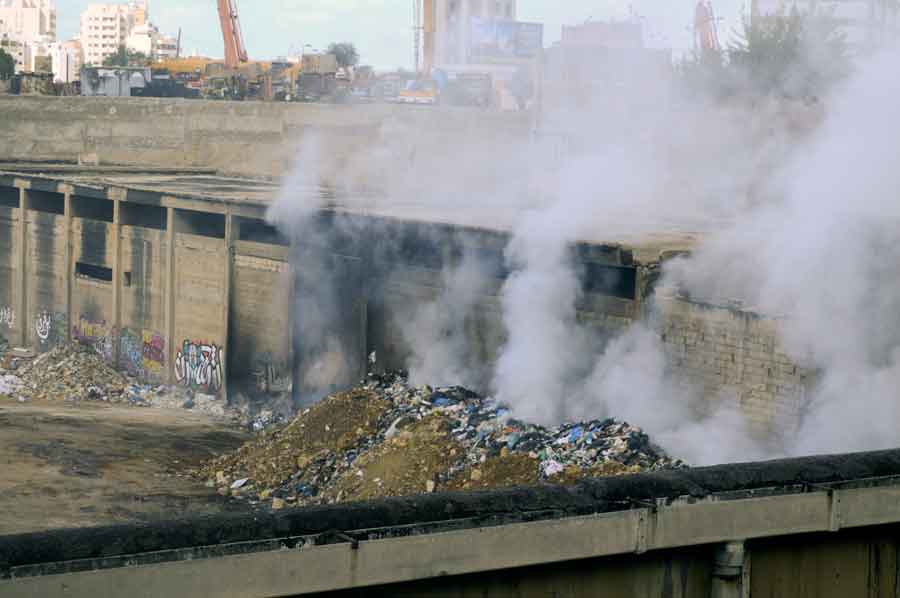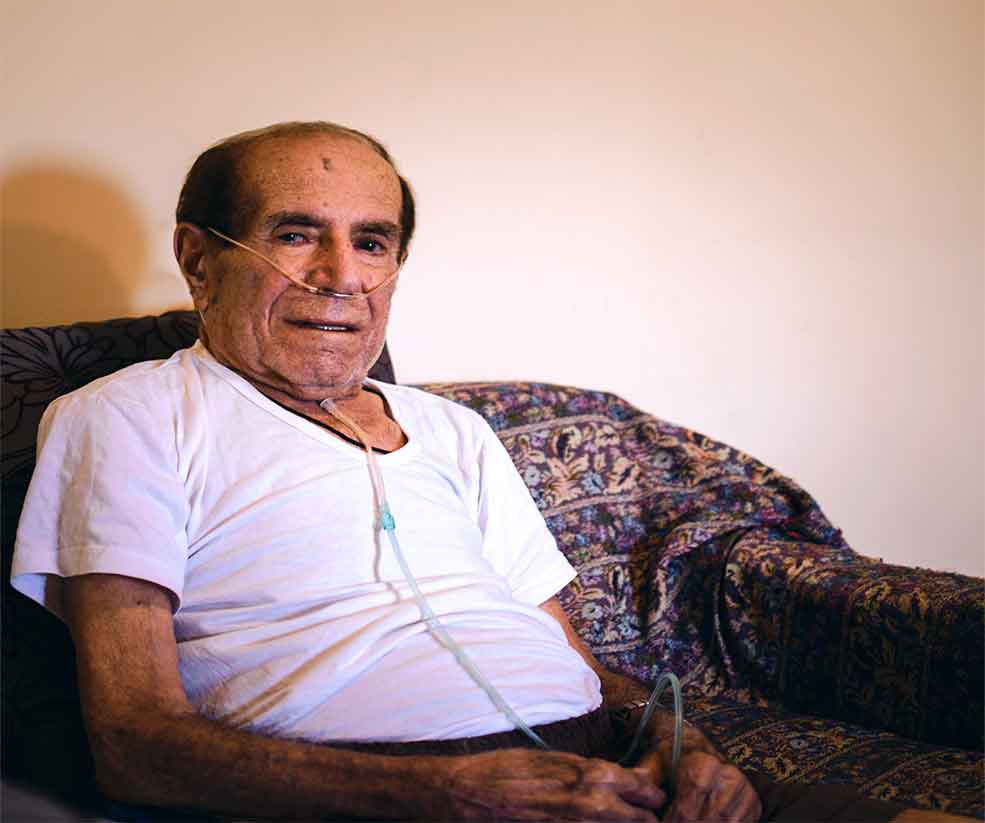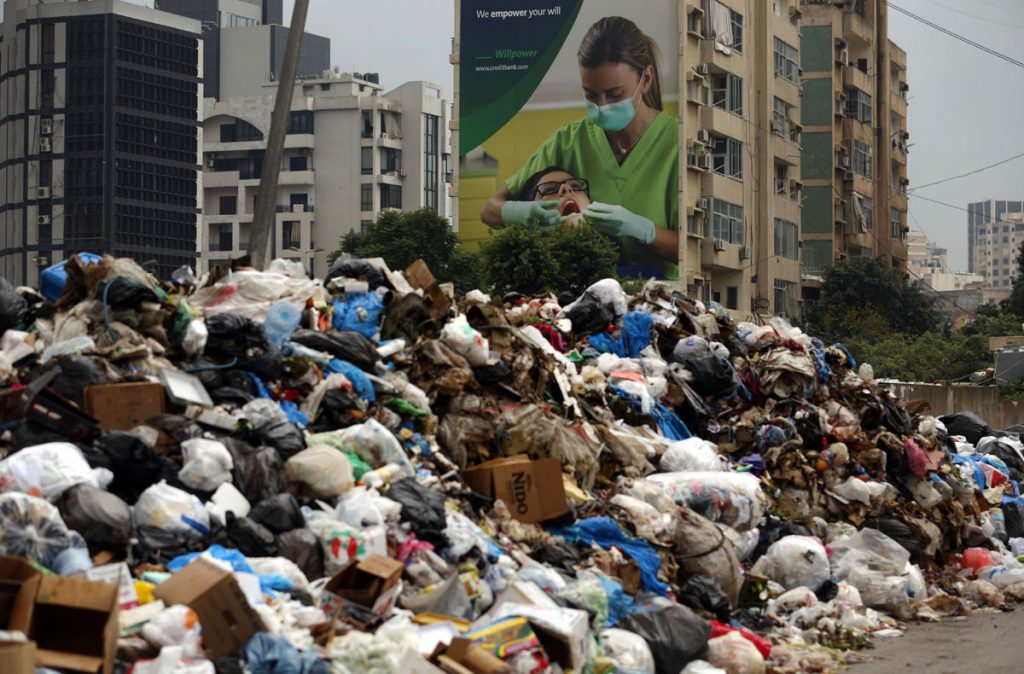For 86-year-old Adib Nouwar, Lebanon’s garbage crisis is a matter of life and death; any irritation induced by the slightest of elements –even the smell of fried food and dust—can be enough to trigger a respiratory fit as his lungs struggle from years of pollution and stress. Under the weight of thick smoke that too often invades his Dekwaneh home, Adib suffers as he is moved from room to room while his family rushes to shut all windows and doors. He manages a frail smile for a photo from behind an oxygen mask, which has become his constant companion.
Wassim, Adib’s son, is both livid and hopeless. He feels let down by the local municipality, the government, and the Lebanese people who he says are complacent and indifferent. Lebanon’s garbage crisis has entered its second chapter with trash making headlines once again after a brief hiatus, and for families like the Nouwars’, it’s an unwelcome sequel.
Dekwaneh, like other lower and middle income suburbs around Beirut and Mount Lebanon that include Dora, Bourj Hammoud, and Jdeideh, has bore the brunt of the garbage crisis. After the brief standoff, which saw the temporary closure of the Bourj Hammoud landfill triggered by protests lead by the Kataeb party and civil society groups, garbage returned to the streets in great numbers.
Following negotiations, the protests were lifted, but the garbage remained. The Bourj Hammoud municipality and the Tashnag party affirmed that no rotting trash would be allowed into said landfill, leaving it up to municipalities to discard of the waste. Having no other means to resolve the issue, many resorted to open incineration and temporary stacking on bridges and highways.
https://www.instagram.com/p/BKvQydFhATC/?taken-by=newsroomnomad
“On some mornings it’s a challenge to make it from my home into my car,” Wassim says. “The toxic fumes makes it difficult and sometimes we even see hordes of invasive insects –flies and ticks—in our neighborhood as the trash remains.”
On the onset of Lebanon’s trash crisis, which began in July 2015, and after rounds of governmental deals on the issue, many thought the situation was under control. But that was simply not the case as garbage reemerged during the hottest months of summer this year –August and September– adding strain to struggle.
“I haven’t filed any complaints simply because I do not trust my municipality; they run the place like gangsters and eliminate dissent mafia style … They shoot stray dogs and at one point even launched a crusade against homosexuals, beating them openly. This is why many suffer in silence,” Wassim says.
Doctors say they are seeing a spike in severe respiratory diseases and that it’s tied to the ongoing trash disaster. The crisis has already taken its toll on many, especially children, the elderly and those with respiratory illnesses and a weak immunity. In July 56-year-old Bourj Hammoud mother of four Rozine Moughalian’s family was forced to raise hundreds of thousands of dollars through crowdfunding for a liver transplant, which doctors linked to exposure to toxins in the area. Countless other cases have also been reported.
Many continue to suffer, and for people like Adib, retirement and rest in his own home have become a luxury he cannot afford.
“My father should be able to at least breathe normal city air and not to be surrounded by smoke from open waste incineration … This morning I woke up before my alarm set off because of the smell. I rushed into his room and it was filled, like the entire house, with fumes. It’s unbearable! If the smell of fried food can kill him, what chance does he have against this? We moved him around and closed all doors and windows to prevent as much smoke as we can from entering,” Wassim told the Newsroom Nomad.

Agriculture Minister Akram Chehayeb has repeatedly said that the only way forward in dealing with the trash crisis is to follow the plan approved by the government earlier this year, which stipulates the opening of two landfills in Bourj Hammoud and Costa Brava. However, accumulated trash that continues to line the streets of several Lebanese areas seems to have slipped through the cracks of said plan. Chehayeb confirms that no municipality is exempted from environmental laws that ban trash burning and confirms that those who breach regulation could face charges. But how much can we really expect from a government whose sole challenge throughout the entire crisis has appeared to be one over profit division and money making, especially since no one seems to be able to identify the culprits? A question that seems to have no answer.
“I returned home late one night around 3 am only to find a huge fire in a nearby makeshift factory dumpsite. In an attempt to identify the culprits I drove to the location of the blaze only to find municipality police vehicles all over the place. I don’t know why but they were just there; some parked, while others were roaming. So, I thought it wasn’t a good idea for me to be noticed while taking pictures…”


